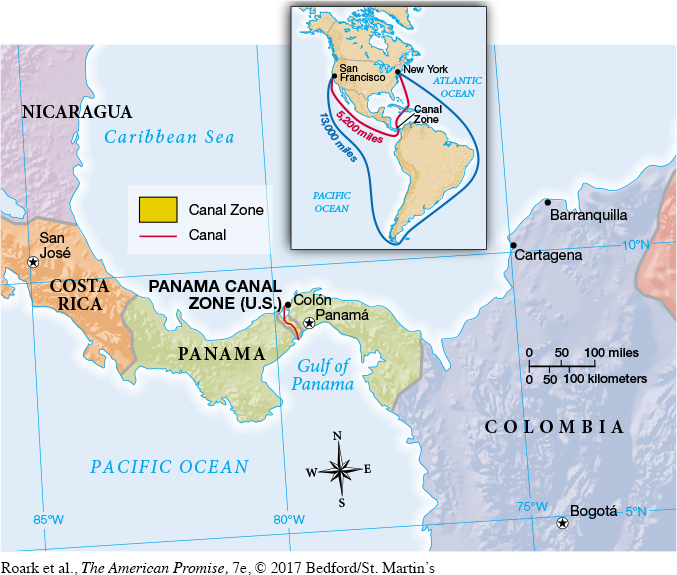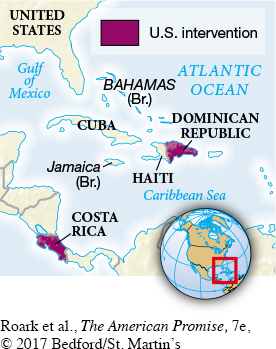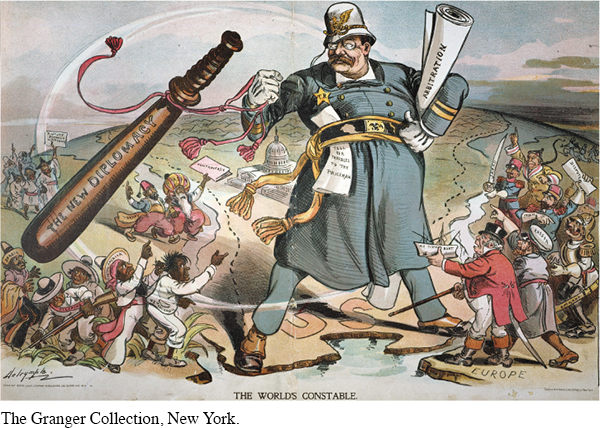The American Promise: Printed Page 600
The American Promise, Value Edition: Printed Page 550
The American Promise: A Concise History: Printed Page 623
The Big Stick
The American Promise: Printed Page 600
The American Promise, Value Edition: Printed Page 550
The American Promise: A Concise History: Printed Page 623
Page 600Roosevelt’s activism extended to his foreign policy. A fierce proponent of America’s interests abroad, he relied on executive power to pursue a vigorous foreign policy, sometimes stretching the powers of the presidency beyond legal limits. In his relations with the European powers, he relied on military strength and diplomacy, a combination he aptly described with the aphorism “Speak softly but carry a big stick.”
A strong supporter of the Monroe Doctrine, Roosevelt jealously guarded the U.S. sphere of influence in the Western Hemisphere. His proprietary attitude toward the Caribbean became evident in the case of the Panama Canal. Roosevelt had long been a supporter of a canal linking the Caribbean and the Pacific. By enabling ships to move quickly from the Atlantic to the Pacific, a canal would trim 8,000 miles from a coast-

The American Promise: Printed Page 600
The American Promise, Value Edition: Printed Page 550
The American Promise: A Concise History: Printed Page 623
Page 601
In the wake of the Panama affair, a confrontation with Germany over Venezuela, and yet another default on a European debt, this time in the Dominican Republic, Roosevelt grew concerned that financial instability in Latin America would lead European powers to interfere. In 1904, he announced the Roosevelt Corollary to the Monroe Doctrine, in which he declared the United States had a right to act as “an international police power” in the Western Hemisphere. Roosevelt stated the United States would not intervene in Latin America as long as nations there conducted their affairs with “decency,” but it would step in to stop “brutal wrongdoing.” The Roosevelt Corollary served notice to the European powers to keep out.
The American Promise: Printed Page 600
The American Promise, Value Edition: Printed Page 550
The American Promise: A Concise History: Printed Page 623
Page 602In Asia, Roosevelt inherited the Open Door policy initiated by Secretary of State John Hay in 1899, designed to ensure U.S. commercial entry into China. As European powers raced to secure Chinese trade and territory, Roosevelt was tempted to use force to gain economic or possibly territorial concessions. Realizing that Americans would not support an aggressive Asian policy, the president sensibly held back.
In his relations with Europe, Roosevelt sought to establish the United States as a rising force in world affairs. When tensions flared between France and Germany in Morocco in 1905, Roosevelt mediated at a conference in Algeciras, Spain, where he worked to maintain a balance of power that helped neutralize German ambitions. His skillful mediation gained him a reputation as an astute player on the world stage and demonstrated the nation’s new presence in world affairs.

The American Promise: Printed Page 600
The American Promise, Value Edition: Printed Page 550
The American Promise: A Concise History: Printed Page 623
Page 603Roosevelt earned the Nobel Peace Prize in 1906 for his role in negotiating an end to the Russo-
When good relations with Japan were jeopardized by discriminatory legislation in California calling for segregated public schools for Asians, Roosevelt smoothed over the incident and negotiated the “Gentlemen’s Agreement” in 1907, which allowed the Japanese to save face by voluntarily restricting immigration to the United States. To demonstrate America’s naval power and to counter Japan’s growing bellicosity, Roosevelt dispatched the Great White Fleet, sixteen of the navy’s most up-